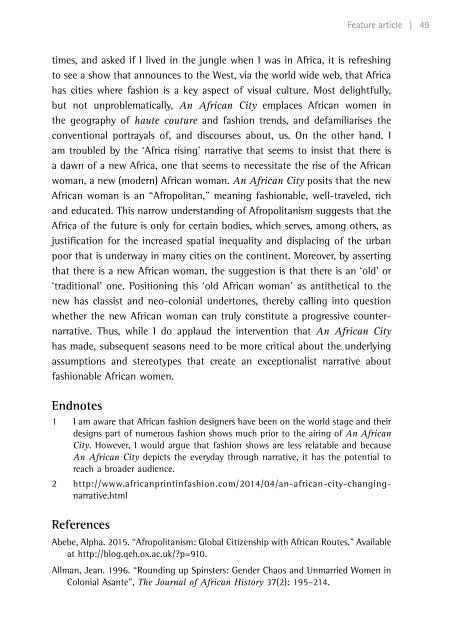The politics of fashion and beauty in Africa
fa21_proof_3
fa21_proof_3
Create successful ePaper yourself
Turn your PDF publications into a flip-book with our unique Google optimized e-Paper software.
Feature article | 49<br />
times, <strong>and</strong> asked if I lived <strong>in</strong> the jungle when I was <strong>in</strong> <strong>Africa</strong>, it is refresh<strong>in</strong>g<br />
to see a show that announces to the West, via the world wide web, that <strong>Africa</strong><br />
has cities where <strong>fashion</strong> is a key aspect <strong>of</strong> visual culture. Most delightfully,<br />
but not unproblematically, An <strong>Africa</strong>n City emplaces <strong>Africa</strong>n women <strong>in</strong><br />
the geography <strong>of</strong> haute couture <strong>and</strong> <strong>fashion</strong> trends, <strong>and</strong> defamiliarises the<br />
conventional portrayals <strong>of</strong>, <strong>and</strong> discourses about, us. On the other h<strong>and</strong>, I<br />
am troubled by the ‘<strong>Africa</strong> ris<strong>in</strong>g’ narrative that seems to <strong>in</strong>sist that there is<br />
a dawn <strong>of</strong> a new <strong>Africa</strong>, one that seems to necessitate the rise <strong>of</strong> the <strong>Africa</strong>n<br />
woman, a new (modern) <strong>Africa</strong>n woman. An <strong>Africa</strong>n City posits that the new<br />
<strong>Africa</strong>n woman is an “Afropolitan,” mean<strong>in</strong>g <strong>fashion</strong>able, well-traveled, rich<br />
<strong>and</strong> educated. This narrow underst<strong>and</strong><strong>in</strong>g <strong>of</strong> Afropolitanism suggests that the<br />
<strong>Africa</strong> <strong>of</strong> the future is only for certa<strong>in</strong> bodies, which serves, among others, as<br />
justification for the <strong>in</strong>creased spatial <strong>in</strong>equality <strong>and</strong> displac<strong>in</strong>g <strong>of</strong> the urban<br />
poor that is underway <strong>in</strong> many cities on the cont<strong>in</strong>ent. Moreover, by assert<strong>in</strong>g<br />
that there is a new <strong>Africa</strong>n woman, the suggestion is that there is an ‘old’ or<br />
‘traditional’ one. Position<strong>in</strong>g this ‘old <strong>Africa</strong>n woman’ as antithetical to the<br />
new has classist <strong>and</strong> neo-colonial undertones, thereby call<strong>in</strong>g <strong>in</strong>to question<br />
whether the new <strong>Africa</strong>n woman can truly constitute a progressive counternarrative.<br />
Thus, while I do applaud the <strong>in</strong>tervention that An <strong>Africa</strong>n City<br />
has made, subsequent seasons need to be more critical about the underly<strong>in</strong>g<br />
assumptions <strong>and</strong> stereotypes that create an exceptionalist narrative about<br />
<strong>fashion</strong>able <strong>Africa</strong>n women.<br />
Endnotes<br />
1 I am aware that <strong>Africa</strong>n <strong>fashion</strong> designers have been on the world stage <strong>and</strong> their<br />
designs part <strong>of</strong> numerous <strong>fashion</strong> shows much prior to the air<strong>in</strong>g <strong>of</strong> An <strong>Africa</strong>n<br />
City. However, I would argue that <strong>fashion</strong> shows are less relatable <strong>and</strong> because<br />
An <strong>Africa</strong>n City depicts the everyday through narrative, it has the potential to<br />
reach a broader audience.<br />
2 http://www.africanpr<strong>in</strong>t<strong>in</strong><strong>fashion</strong>.com/2014/04/an-african-city-chang<strong>in</strong>gnarrative.html<br />
References<br />
Abebe, Alpha. 2015. “Afropolitanism: Global Citizenship with <strong>Africa</strong>n Routes.” Available<br />
at http://blog.qeh.ox.ac.uk/?p=910.<br />
Allman, Jean. 1996. “Round<strong>in</strong>g up Sp<strong>in</strong>sters: Gender Chaos <strong>and</strong> Unmarried Women <strong>in</strong><br />
Colonial Asante”, <strong>The</strong> Journal <strong>of</strong> <strong>Africa</strong>n History 37(2): 195–214.



